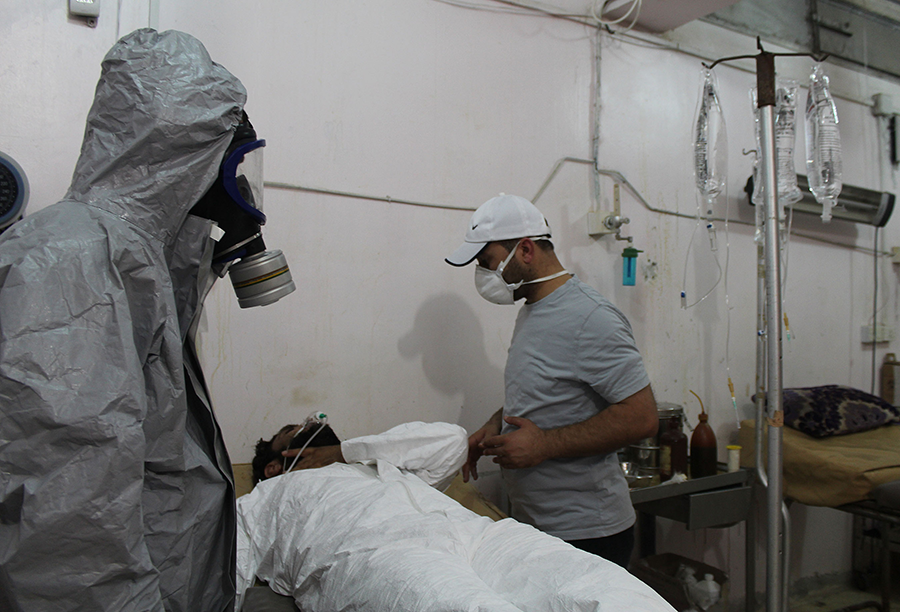Islamic State Group Blamed for Chemical Attack in Syria
April 2024
By Mina Rozei
The Islamic State group likely carried out an attack in Syria using chemical weapons nine years ago, according to international experts responsible for investigating the use of these banned weapons.
 In a report on Feb. 22, the Investigation and Identification Team (IIT) of the Organisation for the Prohibition of Chemical Weapons (OPCW) said that there are “reasonable grounds” to find the Islamic State group culpable for the attack in Marea on Sept. 1, 2015, in which 11 individuals showed symptoms consistent with exposure to sulfur mustard.
In a report on Feb. 22, the Investigation and Identification Team (IIT) of the Organisation for the Prohibition of Chemical Weapons (OPCW) said that there are “reasonable grounds” to find the Islamic State group culpable for the attack in Marea on Sept. 1, 2015, in which 11 individuals showed symptoms consistent with exposure to sulfur mustard.
“The Secretariat of the OPCW has once again delivered on the mandate it has received to identify perpetrators of chemical weapons use in Syria,” OPCW Director-General Fernando Arias said when the report was released. “This is a stark reminder to the international community that nonstate actors like [the Islamic State group] have developed the capacity and the will to use chemical weapons.”
The report concludes a comprehensive year-long OPCW investigation into the attack in Marea.
Investigators found that the Islamic State group deployed sulfur mustard using one or more artillery guns, asserting that “no other entity possessed the means, motives, and capabilities to deploy sulfur mustard as part of an attack in Marea” on that date.
According to the report, 11 individuals who “came into contact with the liquid substance experienced symptoms consistent with exposure to sulfur mustard.”
The IIT was able to reconstruct the organizational chain of command that led to the attack and identify four individuals as perpetrators and two additional Islamic State members as primary drivers of the group’s chemical weapons program.
Using a finding of “reasonable grounds” to assign the responsibility to the Islamic State group is a “standard of proof consistently adopted by international fact-finding bodies and commissions of inquiry,” the report said.
The IIT relied on interviews, information from the OPCW Fact-Finding Mission, states-parties to the Chemical Weapons Convention (CWC), and various forensic evidence and data to reach its conclusions.
The Syrian Network for Human Rights, a primary nongovernmental organization providing the IIT with on-the-ground information, has documented five chemical weapons attacks by the Islamic State group and 132 casualties since the group emerged in Syria in 2013.
This case marks the first time that the IIT has established that a nonstate actor perpetrated a chemical weapons attack in Syria. Mozambique’s UN ambassador, speaking at a UN Security Council meeting on behalf of Algeria, Guyana, and Sierra Leone, declared that the findings “suggest that, henceforward, the Syrian chemical weapons program will be seen in a different perspective.”
The findings document the latest in a series of confirmed chemical attacks in Syria and underscore growing frustration that CWC states-parties are becoming less compliant with the treaty. “The absence of accountability for the use of chemical weapons continues to be a threat to international peace and security,” said Adedeji Ebo, director and deputy to the UN high representative for disarmament affairs, at a Security Council meeting on March 4.
The findings provoked a mixed reaction at the meeting. Some states, such as the United States, criticized Syria for failing to comply with the OPCW and pointed to the latest IIT report as proof that the OPCW remains impartial. France, Japan, and Slovenia also praised the OPCW’s impartiality and called on Syria to comply with the IIT.
Syria insisted that it destroyed its chemical weapons stockpile and is cooperating with the OPCW. Russia and Iran defended Syria and said the OPCW is being exploited by Western countries.
The IIT report was released before the OPCW Executive Council met in The Hague on March 5-8 where its findings were discussed. Arias reported that Syria’s chemical stockpile declaration continues to have “gaps, inconsistencies, and discrepancies that remain unresolved [and] the Secretariat assess[es] that the declaration submitted by [Syria] still cannot be considered accurate and complete.”
